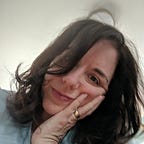Passage to adulthood on 9/11
On 9/11/2001, I was a newly graduated college student trying to earn a decent living off a liberal arts degree that I half-heartedly earned. To clarify, I wasn’t necessarily passionate about French or Art History but more interested in these subjects than in other subjects and if truth be told, it was French cinema that really made me sign up for French classes and my UMich professor. I was particularly interested in films about the colonized countries in West Africa and the legacy left behind by the French.
Chocolat (the French film from 1988 — and not to be confused with the culinary rom-com with Juliette Binoche from 2000) is a semi-autobiographical film that takes place in the late 1950s Cameroon and details the racial, social, gender and class tension between the French and Africans as played out by the narrator’s mother, Aimee, and servant, Protee. For a quick mood-setter and synopsis and not to mention the most poignant analysis of the film I’ve read to date, see Robert Ebert’s review from 1989.
Chocolat was acclaimed Director Claire Denis’ first feature film but make no mistake there are no freshman flaws in this film. On the contrary, it’s intentional, raw and provocative and gets at the nuances of emotion (in all their primal glory) in a way that female directors do well.
The film combined my love of foreign history, language, culture and narrative. It humanized places and people I hadn’t been exposed to. It didn’t shy away from people’s cruelty, the injustices and crimes that society and people inflict on other another, and the indelible marks that those assaults leave on people for generations to come. You left the film feeling a longing and a sadness but not anger or resentment, just wistfulness.
I think about this film and my own adult awakening and 9/11 in the same breadth. When 9/11 happened, I was working at a small architectural firm in Cambridge, MA as a Marketing Manager. I was suffering from, I-don’t- know- want-I-want-to-be-when-I grow-up-itis which is really just wasted self-inflicted mental anguish that my 40-something-self knows could have been repurposed for writing, but my 20-something-year-old self felt signified being a less than.
As an introvert, I found my way to writing eventually and maybe or maybe not I would have found myself here without such a life negating or life affirming event happening. How else does someone who has trouble orally articulating loss and sadness without tears flooding their eyes and betraying them express their anguish and grief?
In any event, today marks the 20th anniversary of a day in history that our nation should never forget, nor can forget. For me, it marks a period of time, that framed an end to my childhood and that invisible cloak of security and protection I took for granted.
Perhaps, this sense of safety was always as elusive as the horizon, that France’s (narrator from Chocolat) father so beautifully frames for her:
When you look at the hills, beyond the houses and beyond the trees, where the earth touches the sky, that’s the horizon. Tomorrow, in the daytime, I’ll show you something. The closer you get to that line, the farther it moves. If you walk towards it, it moves away. It flees from you. I must also explain this to you. You see the line. You see it, but it doesn’t exist.
